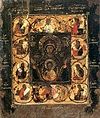

| Previous day | Next day |
| Old Style
March 8
|
Wednesday |
New Style
March 21
|
|
5th Week of Great Lent.
Tone 8.
Great Lent. |
Wine and oil allowed.
|
![]() St. Theophylactus, bishop of Nicomedia (842-845).
St. Theophylactus, bishop of Nicomedia (842-845).
Apostle Hermas of the Seventy (1st c.). Hieromartyr Theodoretus, priest, of Antioch (361-363). Sts. Lazarus, founder (1391) and Athanasius, monk (15th c.), of Murmansk Monastery (Karelia). St. Andronicus (Lukash), schema-archimandrite of Tbilisi, Georgia, elder of Glinsk Monastery (1974).
“Kursk Root” Icon of the Sign of the Most Holy Theotokos (1898).
St. Felix of Burgundy, bishop of Dunwich and enlightener of East Anglia (ca. 648). Martyrs Quintilian and Capatolinus, at Nicomedia. St. Julian, archbishop of Toledo (690). St. Paul the Confessor, bishop of Plousias in Bithynia (ca. 840). St. Tarasius the Wonderworker, of Lycaonia.
Repose of Blessed Basiliscus of Uglich (1863) and Archbishop Vitaly (Maximenko) of Eastern America (1960).
Thoughts for Each Day of the Year
According to the Daily Church Readings from the Word of God
By St. Theophan the Recluse

Wednesday.
The way of life is above to the wise, that he may depart from hell beneath (Prov. 15:24). It is well-known to all that hell exists, and that anyone can end up there as a result of his deeds. But not all remember this, or live so piously that they are clearly trying to to avoid hell. They live without thinking about it, saying, “Maybe… Maybe we somehow will not end up in hell.” Where is our reason? In earthly affairs one can somehow get away with “maybe,” but in such a decisive affair, which, once accomplished, will abide unto the ages of ages unchanged, “maybe” reveals lack of reason to the utmost degree. Do not pride yourself, O Reason, on your reasonableness, when you do not remember this and do not suggest to us thoughts of life: how to avoid hell in order to be saved.
Articles
 Apostle Hermas of the SeventyThe Holy Apostle Hermas of the Seventy was bishop at Philippopolis, and died a martyr in the first century. |
 Hieromartyr Theodoritus of AntiochSaint Theodoritus was a presbyter and keeper of sacred vessels at the cathedral church in Antioch. |
 Venerable Athanasius of MuromSaint Athanasius was igumen at the monastery of Saint Lazarus during the mid-fifteenth century. |
 Icon of the Mother of God “Kursk-Root”The Kursk Root Icon of the Mother of God “Of the Sign” is one of the most ancient icons of the Russian Church. |





